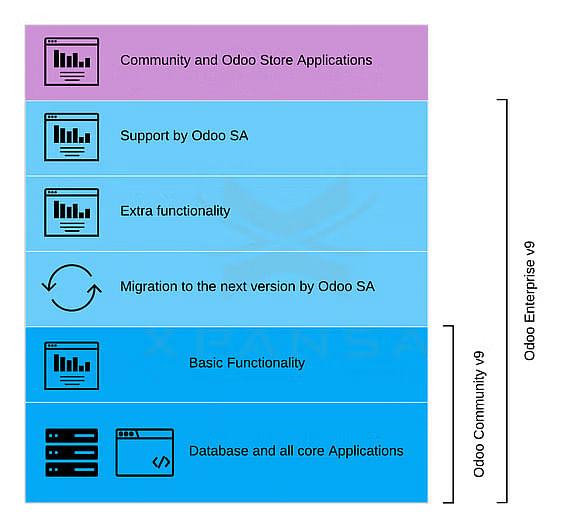In the starting phase, odoo familiar as openERP is a set of open-source enterprise management applications.
The large companies, small businesses, associations and many different types of organizations used odoo for control, automate, measure and optimize their operations, finance and projects.
In the odoo versions 6,7, & 8 there are no technical variations between the community and enterprise version and it has changed in V9.
Features of Odoo Community
The Odoo Community Association is the non-profitable organization which promotes the global use of odoo and assists the synergetic development of odoo feature.
It provides financial, organizational and legal assistance to the larger odoo open source community. It is also provided as an independent legal entity where community members can subscribe to the code, funding, and other resources with knowledge and their subscription will be maintained for public benefits.
Odoo software can be used, modified and distributed by anyone.
The source code, bug reports pull requests are hosted by GitHub to access anyone.
Get a FREE Consultation To Select The Best Odoo Options
Features of Odoo Enterprise
If the user applies for the proprietary license he/she only can use the odoo enterprise subscription.
- Modifications are allowed.
- Distribution only to odoo enterprise subscribers.
All Odoo projects are fully hosted on GitHub and have access to all partners and customers who have an Odoo subscription.
The whole database and back-end applications, without limitations, are in Odoo Community.
- Basic Functionality is in Odoo Community.
- Migration to the next version by Odoo SA engineers is in Odoo Enterprise.
- Several Functionalities are in Odoo Enterprise.
- Support of the non-customized Odoo Enterprise by Odoo SA Engineers.
- Apps from Odoo Store.

Odoo Enterprise is a combination of “odoo community + additional functional modules”
The difference between the two editions.
Layer | Community Version 9 | Enterprise Version 9 |
Required Hardware
|
From 2 CPU/ @ RAM
|
From 2 CPU/ @ RAM
|
Scalability
|
The same load balancing
|
The same load balancing
|
Flexibility
|
The same modular architecture
|
The same modular architecture
|
Community and Store App
|
Can Install any module
|
Can Install any module
|
Enterprise App
|
Not available
|
Included in the package
|
Localization
|
The same localization
|
The same localization
|
Out-of-the-box
|
Requires more customization
|
Includes nice UI and more functionality
|
Access rights
|
The same configuration
|
The same configuration
|
UI
|
Standard interface
|
Nice and fast navigation
|
Support and upgrade
|
Not included
|
Not included
|
Price
|
No license cost
|
20 EUR/user/month
|
Development access
|
It can be utilized by developers.
|
To access enterprise you will have to purchase LGPL(Lesser General public license) which has been published by free software foundation.
|
Control
|
You can install any module via community and store apps
|
You can not install any module directly.
|
Mobile support
|
Not available
|
Available
|
|
Uniqueness
|
Community Edition does not contain all the features of an enterprise.
| Enterprise Edition does contain all the features of the community. |
Hardware & Scalability
- If we follow the hardware essence odoo can be estimated for companies of almost any size and odoo did it for 2000 global companies with vast terrestrial distribution but it recommended the breaking applications and database servers for 90 employees. The load balancing of the application server would be used for a company that has 250+ employees.
- There are 90% free and 10% paid applications are available in the odoo app store.
- Odoo Enterprise includes additional unique modules that will move the ERP experience to the next level.
- Any localization can be installed as additional on both versions.
Flexibility in Community & Enterprise Apps
Odoo has a modular structure, which, you can customize through modules and database configuration.
What? Want To Community Version From Enterprise Version?
You can schedule a meeting with our experts who have helped hundreds of businesses move to the community version with custom features.
Functionality difference between community and enterprise apps
Odoo Modules | Community Version | Enterprise Version |
Finance Management
|
|
|
Project Management
|
|
|
Sales & CRM
|
|
|
Human Resource Management
|
|
|
Inventory and supply chain management
|
|
|
Website and ecommerce
|
|
|
Point Of Sale
|
Point of sale (offline mode)
|
Point of sale restaurant loyalty cards.
|
|
Marketing
|
|
|